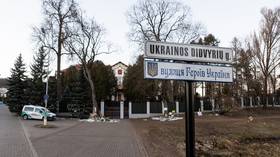Latvia has been calling on the bloc to ban agriculture exports from its neighbor over the Ukraine conflict
Latvia significantly increased the volume of grain bought from Russia in the first quarter of 2024, the state revenue service in Riga announced on Monday. The Baltic nation recently announced a ban on some Russian imports, but exempted two key products.
Riga has been one of the most outspoken advocates of imposing EU sanctions on Russian grain, citing the Ukraine conflict. This has not stopped Latvia from increasing its agricultural imports from Russia by almost 40% compared to the first quarter of 2023.
A total of 158,325 tons of grain – mainly corn – came in across the border in the first three months, 39.8% more than in Q1 last year, the Latvian customs agency told the Baltic News Service. The value of imports was estimated at just over €27 million ($29 million).
In addition to 135,539 tons of corn, Latvia brought in 8,530 tons of rye and 8,744 tons of wheat and wheat-rye mixture, among other grains. Rye imports rose by 70% year over year, while corn imports increased by 26.5%.
The authorities in Riga do not have information about how much of the imported grain was actually consumed in the country and how much was exported to other EU member states. Latvia has a population of 1.88 million, making a domestic-consumption explanation highly unlikely.
Moreover, 596,807 tons of Russian grain – mainly wheat, corn and barley – intended for other countries transited through Latvia in the first quarter of this year, 78.9% more than in the same period of 2023.
In February, the Latvian parliament imposed a ban on importing animal feed from Russia and Belarus, in order to show solidarity with Ukraine. However, the ban contained exemptions for two key products.
Sunflower cake, which is used as chicken feed by egg and poultry farmers, is not produced in the EU. Latvia buys about €50 million worth of it from Russia every year and likely exports some of it elsewhere into the bloc, according to the state broadcaster LSM.
Another product exempt from the ban is beet pulp with molasses, used to feed cows and pigs. Latvia imported more than €25 million worth from Russia last year.
Russia is one of the world’s largest exporters of grain, feed and fertilizer. While these commodities have not been outright sanctioned by the US and its allies on account of the Ukraine conflict, their transport by sea has been made more difficult by sanctions on commercial shipping.


